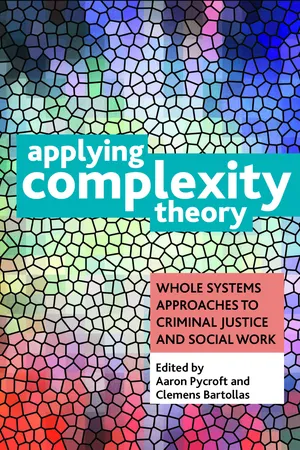
- 328 pages
- English
- PDF
- Available on iOS & Android
About this book
Approaches based around complexity theory are increasingly being used in the study of organisations and the delivery of services. This is the first book to explore the application of complexity theory to difficult practice issues in criminal justice and social work and is intended to stimulate debate. It brings together experts in this emerging field to address complexity theory from a range of perspectives (positivist, realist, and constructivist), providing a detailed but accessible discussion of the key issues to whole systems approaches. The chapters cover theory and research on the nature of complex adaptive systems, their application to key areas of service delivery and the efficacy and ethics of criminal justice and social work interventions. The book argues for the usefulness of applying complexity theory to address significant and intractable social problems and also challenges the reductionist approaches to solving those problems currently favoured by policy makers. It will be of interest to academics and postgraduate students in social work and criminal justice.
Frequently asked questions
- Essential is ideal for learners and professionals who enjoy exploring a wide range of subjects. Access the Essential Library with 800,000+ trusted titles and best-sellers across business, personal growth, and the humanities. Includes unlimited reading time and Standard Read Aloud voice.
- Complete: Perfect for advanced learners and researchers needing full, unrestricted access. Unlock 1.4M+ books across hundreds of subjects, including academic and specialized titles. The Complete Plan also includes advanced features like Premium Read Aloud and Research Assistant.
Please note we cannot support devices running on iOS 13 and Android 7 or earlier. Learn more about using the app.
Information
Table of contents
- APPLYING COMPLEXITY THEORY
- Contents
- List of tables and figures
- Notes on contributors
- Introduction
- 1. Complexity theory: an overview
- 2. Risk, attractors and organisational behaviour
- 3. Why do people commit crime? An integrated systems perspective
- 4. Complexity and the emergence of social work and criminal justice programmes
- 5. Child protection practice and complexity
- 6. Youth justice: from linear risk paradigm to complexity
- 7. The Stephen Lawrence Inquiry: a case study in policing and complexity
- 8. Intersecting contexts of oppression within complex public systems
- 9. Complexity theory, trans-disciplinary working and reflective practice
- 10. Probation practice and creativity in England and Wales: a complex systems analysis
- 11. Responding to domestic abuse: multi-agented systems, probation programmes and emergent outcomes
- 12. Complexity, law and ethics: on drug addiction, natural recovery and the diagnostics of psychological jurisprudence
- 13. Constituting the system: radical developments in post-Newtonian society
- Conclusion
- Index